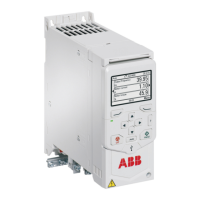■ Protecting the motor against thermal overload
According to regulations, the motor must be protected against thermal overload and the
current must be switched off when overload is detected. The drive includes a motor
thermal protection function that protects the motor and switches off the current when
necessary. Depending on a drive parameter value, the function either monitors a
calculated temperature value (based on a motor thermal model) or an actual temperature
indication given by motor temperature sensors.
The motor thermal protection model supports thermal memory retention and speed
sensitivity. The user can tune the thermal model further by feeding in additional motor
and load data.
The most common temperature sensor types are thermal switch (for example Klixon),
PTC or Pt100.
For more information, see the firmware manual.
■ Protecting the motor against overload without thermal model or
temperature sensors
Motor overload protection protects the motor against overload without using motor
thermal model or temperature sensors.
Motor overload protection is required and specified by multiple standards including the
US National Electric Code (NEC), UL 508C and the common UL/IEC 61800-5-1 standard
in conjunction with IEC 60947-4-1. The standards allow for motor overload protection
without external temperature sensors.
The protection feature allows the user to specify the class of operation in the same
manner as the overload relays are specified in standards IEC 60947-4-1 and
NEMA ICS 2.
The motor overload protection supports thermal memory retention and speed sensitivity.
For more information, see drive firmware manual.
Implementing a motor temperature sensor connection
WARNING!
IEC 60664 and IEC 61800-5-1 require double or reinforced insulation between
live parts and accessible parts when:
• the accessible parts are not conductive, or
• the accessible parts are conductive, but not connected to the protective earth.
Obey this requirement when you plan the connection of the motor temperature
sensor to the drive.
You have these implementation alternatives:
56 Guidelines for planning the electrical installation

